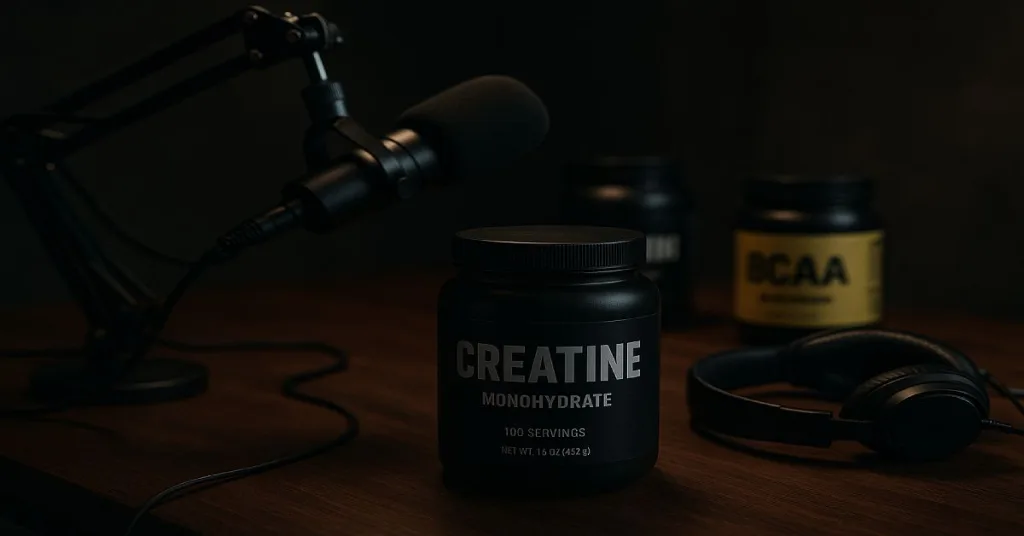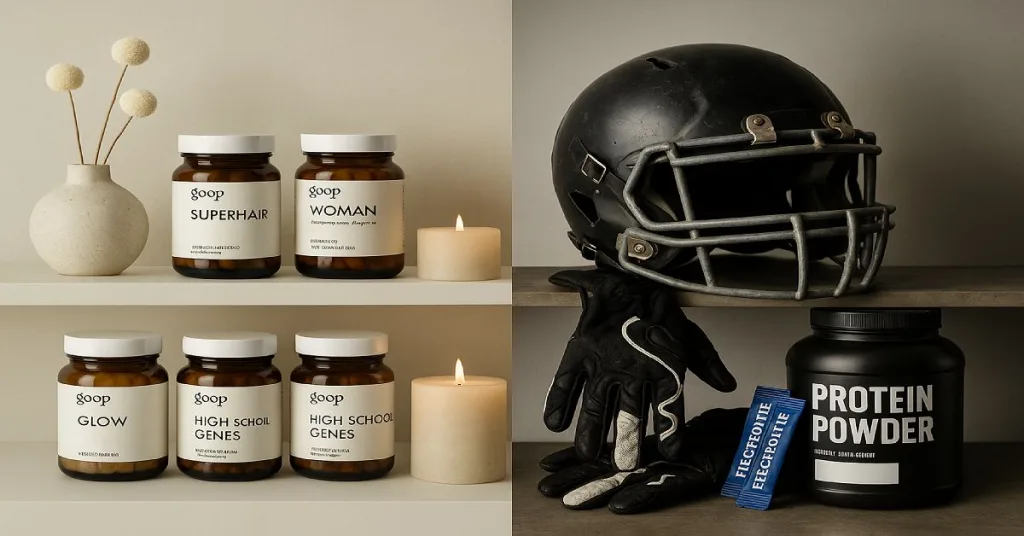Why We Obsess Over Celebrity Supplements
Celebrities don’t just sell music, movies, or touchdowns. They sell lifestyles.
If your favorite star swears by a powder, pill, or “energy blend,” it feels like a shortcut to their success. Want Rogan’s focus? Brady’s endurance? Paltrow’s glow? Just buy the bottle, right?
Here’s the problem: celebrity endorsements rarely line up with scientific reality.
Behind the branding, some of these stacks contain real, evidence-backed supplements that could help your health. Others? Pure marketing, wrapped in pseudoscience, and priced at a premium.
This guide breaks down the most famous celebrity supplement stacks—Joe Rogan, Tom Brady, Gwyneth Paltrow, plus a few others—and separates the hype from the facts. You’ll see what’s worth trying, what to skip, and cheaper alternatives that deliver the same results.
This post may contain affiliate links. If you click and purchase, I may earn a small commission at no extra cost to you. I only recommend products I personally use or have thoroughly researched.
Joe Rogan: The “Podcast Stack”
Joe Rogan might be the most supplement-obsessed celebrity alive. As the co-founder of Onnit, he turned his personal habits into a supplement empire. His daily routine reportedly includes:
- Alpha Brain (nootropic)
- Creatine
- Vitamin D
- Fish oil
- Mushroom blends (Lion’s Mane, Cordyceps, Chaga)
The Hype
Alpha Brain is sold as a cognitive enhancer: memory, focus, mental speed. It’s Rogan’s crown jewel supplement and one of the first “mainstream” nootropics. Creatine is positioned as a muscle booster but marketed by Rogan as a brain enhancer, too. The mushrooms? Supposedly for energy, immunity, and focus.
The Science
- Alpha Brain: Two small clinical studies showed mild cognitive improvements—but both were funded by Onnit. Independent evidence is thin. Most scientists consider it overhyped.
- Creatine: A slam dunk. Strong evidence for improving strength, recovery, and even memory/mental performance. Cheap and proven.
- Vitamin D: Essential if you’re deficient (and most people are, especially in winter). Backed by decades of research.
- Fish oil: Solid evidence for reducing inflammation and supporting heart and brain health, though results vary.
- Mushrooms: Lion’s Mane shows early promise for nerve growth factor and memory, but research is still young. Cordyceps may help with endurance. Most others are hype-heavy.
Verdict
Rogan’s stack is half hype, half legit. Alpha Brain is more marketing than miracle. But creatine, vitamin D, and fish oil are worth your money.
👉 Smart Buy Instead: Skip the expensive Alpha Brain and grab creatine monohydrate + caffeine. Cheaper, better-studied, and far more effective for energy and focus.

Tom Brady: The TB12 Regimen
Tom Brady built an entire brand (TB12) around the idea that his longevity in football comes down to a unique “anti-inflammatory, alkalizing” approach. His supplement line includes:
- TB12 electrolytes
- Protein powders
- Plant-based energy supplements
The Hype
TB12 markets itself as an advanced system for hydration and performance. The buzzword is “alkalizing”—the idea that balancing pH levels keeps inflammation down and boosts recovery. The brand charges premium prices for what looks like very basic formulas.
The Science
- Electrolytes: Every athlete needs them. Sodium, potassium, magnesium, calcium. TB12 sells what you can find anywhere, but at 2–3x the cost.
- Alkalizing claims: Total pseudoscience. Your body regulates pH tightly. No drink changes that.
- Protein powders: Good protein is always useful for recovery and strength. But there’s nothing unique about TB12’s blends.
Verdict
Brady’s success comes from training, discipline, and genetics—not “alkalizing” powders. His stack is clean, not dangerous, but massively overpriced.
👉 Smart Buy Instead: Save your money with an LMNT or Liquid I.V. electrolyte mix plus a standard whey or plant-based protein. You’ll get the same benefit without the TB12 markup.
Gwyneth Paltrow: The Goop Cabinet
If Rogan is the king of nootropics, Paltrow is the queen of pseudoscience. Through her Goop brand, she’s marketed everything from supplements to “psychic vampire repellent.” Yes, really.
Her Goop supplement line has included:
- Ashwagandha blends
- Magnesium powders
- Probiotics
- Beauty “elixirs” for hair, skin, nails
- And plenty of wildly unproven formulas
The Hype
Goop markets its products as luxury wellness, wrapped in astrology-level branding. The promise is that you’ll balance your hormones, detoxify your body, and glow like Gwyneth.
The Science
- Ashwagandha: Actually well-studied for stress reduction and cortisol balance. A legit adaptogen.
- Magnesium: Science-backed for relaxation, sleep, and muscle function.
- Probiotics: Some strains work, but Goop never specifies dosages or guarantees clinical backing.
- The rest: “Energy” blends, hormone balancers, and “detox” dusts are pseudoscience wrapped in shiny packaging.
Verdict
Paltrow mixes legit ingredients with unproven gimmicks and charges luxury prices. Her brand is more about lifestyle than results.
👉 Smart Buy Instead: Stick with ashwagandha, magnesium glycinate, and probiotics from trusted brands like NOW, Life Extension, or Garden of Life.

Other Celebrity Favorites
LeBron James
LeBron is known for investing millions into his body each year, and his supplement use reflects a performance-driven approach. He emphasizes hydration formulas, recovery drinks, and high-quality protein to keep up with his grueling NBA schedule. Nothing exotic here—just the basics dialed in at a very high level. The science checks out: staying hydrated and fueling muscles with protein are as real as it gets.
Kim Kardashian
Kim once made headlines for promoting “appetite suppressant lollipops” on Instagram, a product that was essentially sugar and questionable herbal blends marketed as diet aids. Nutritionists slammed the move as irresponsible, especially given her young audience. Appetite suppressant gimmicks like these are widely considered junk science, and certainly not a path to healthy or sustainable weight management.
Mark Wahlberg
Wahlberg has his own supplement line, pushing protein powders, vitamins, and wellness drinks. The protein side of things is fine—no one disputes that whey or plant protein can help with recovery and muscle maintenance. But his line has also leaned into detox teas and “cleansing” products, which are marketing-driven nonsense. The useful stuff is fine, but the “cleanse” claims are pure scam territory.
Jennifer Aniston
Aniston has become one of the biggest celebrity promoters of collagen powders, working with brands that push it as a beauty and anti-aging solution. The science is mixed: collagen supplementation may support joint comfort, skin hydration, and elasticity, but results vary widely and often depend on dosage and form. It’s not a miracle powder, but it’s not total hype either—more of a “mildly helpful” supplement than a fountain of youth.
What Actually Checks Out
Here’s what science actually supports when you strip away the marketing:
Worth Your Money
- Creatine → muscle and brain performance.
- Vitamin D → immunity and bone health (if deficient).
- Omega-3s → cardiovascular and anti-inflammatory benefits.
- Magnesium → relaxation, sleep, and energy metabolism.
- Collagen → maybe useful for skin/joints, not a miracle.
Not Worth It
- “Alkalizing” supplements.
- Detox teas.
- Appetite suppressant lollipops.
- Most celebrity nootropic blends.
- Goop’s mystical formulations.
Smarter, Cheaper Alternatives
Instead of paying celebrity prices:
- Instead of Alpha Brain → Try creatine + caffeine. Backed by hundreds of studies, not just one company’s trial.
- Instead of TB12 powders → Grab a $1 electrolyte mix and a $25 protein tub. Same science, less fluff.
- Instead of Goop dusts → Buy pure ashwagandha, magnesium, or probiotics at half the cost.
Celebrities sell stories. Science sells results.
Final Thoughts: Don’t Buy the Glow
Celebrities make millions turning supplements into status symbols. Joe Rogan sells “focus in a bottle.” Tom Brady sells “longevity.” Gwyneth sells “mystical balance.” But the reality is simple:
- Some supplements really do work.
- Others are snake oil with better packaging.
- You don’t need to spend $90 on a “detox” dust to see results.
If you want a celebrity-level stack without the BS, here’s a blueprint grounded in science and affordability:
- Creatine (5g daily)
- Vitamin D (if deficient, get tested)
- Magnesium glycinate (200–400 mg daily)
- Omega-3 fish oil
- Optional: collagen for skin/joint support
That’s it. No vampire repellents required.
further reading: Supplements 101: A Complete Beginner’s Guide to Building a Safe & Effective Routine